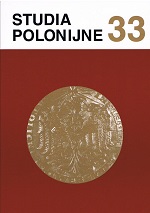Emigracja w dekanacie sokołowskim przed II wojną światową
Emigration in the Sokołów Decanate before the Second World War
Author(s): Bartosz WalickiSubject(s): Cultural Essay, Political Essay, Societal Essay
Published by: Towarzystwo Naukowe KUL & Katolicki Uniwersytet Lubelski Jana Pawła II
Keywords: Sokołów Małopolski; emigration (before 1939)
Summary/Abstract: Starting from the end of the 19th century the Sokołów region was one with an increased rate of emigration – seasonal and permanent. This state was maintained after establishing the Sokołów Decanate, until the outbreak of the Second World War (1921-1939). The main reason for this was poverty of the population and a lack of prospects for the future. The destination for permanent emigration was first of all the United States, and also: Argentina, Brazil, France and Canada. Seasonal emigrants went, among others, to Czech Republic, Denmark, Lithuania, Latvia and Germany. In 1924 there were 2.844 faithful from the SokoLów Decanate living in emigration. Most of them came from the Kamień, Medynia Głogowska and Sokołów Małopolski Parishes. Improvement in the economic situation of the emigrant’s families was a positive result of the phenomenon. The emigrants often financed religious works and supported the local pastorate. Giving money for renovation and for completing the furnishings of the churches in Górno, Medynia Głogowska, Sokołów, Stobierna, Trzeboś and Wólka Niedźwiedzka should be emphasized here. The emigrants aided children coming from poor families, took care of school buildings, and supported the erection of the patriotic monument in Sokołów. On the other hand, alarming phenomena were noted in the sphere of morality and customs. Emigration contributed to breakdowns of marriages and impairing family and social life. Debauchery, drunkenness, wastefulness, moral decline, a loss of trust in authorities spread among the people returning from abroad. Especially dangerous were crises of faith, neglecting religious practices, or even leaving the Catholic Church. Also agitating for Bible Students in Sokołów, Trzeboś and Wólka Niedźwiedzka had emigration as its source. The phenomenon of emigration met with a reaction from the clergy. Initiating devotional actions was a manifestation of the priests’ sensitiveness to the problem. They strengthened emigrants in their faith, encouraged them to go in for religious practices frequently, and propagated the cult of Our Lady of Sokołów. Their pastoral care included correspondence with emigrants and preaching sermons connected with the issue. Sometimes the priests also organized special services for emigrants.
Journal: Studia Polonijne
- Issue Year: 2012
- Issue No: 33
- Page Range: 57-78
- Page Count: 22
- Language: Polish

